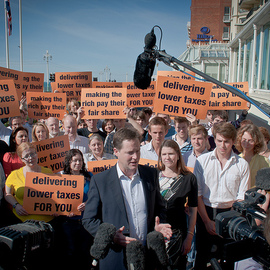
After the Lib Dems, Labour makes the financial services sector sit up
The contrast between the Labour and Liberal Democrat conferences is already very marked and we are only into the second day of the Labour conference.
The key differece, of course, is the mood of the two parties, one under siege and the other cautiously confident. A key difference from the financial services sector perspective is that Labour has started sending out some very clear and specific policy messages which will cause more than a few ripples of concern.
The Liberal Democrat conference was all about damage limitation, principally executed around shoring up Nick Clegg's leadership and in this objective it succeeded. They may have stopped the rot but I doubt if the opinion polls at the end of the conference season will show much more than that. There was plenty of noise about "fairer taxes", a hastily cobbled together policy platform in repsonse to polls that showed the only significant coalition policy the Lib Dems are being given credit for is the raising of personal allowances.
 The attempts to build on this by talking about taxing the rich seemed more rhetorical than substantial. The sudden enthusiasm of the leadership for Vince Cable's "mansion tax" that the Clegg camp were dismissive of two years ago did not seem very convincing and they will have a tough time selling this overall stance after letting the Tories cut the top rate of Income Tax to 45% in the Budget.
The attempts to build on this by talking about taxing the rich seemed more rhetorical than substantial. The sudden enthusiasm of the leadership for Vince Cable's "mansion tax" that the Clegg camp were dismissive of two years ago did not seem very convincing and they will have a tough time selling this overall stance after letting the Tories cut the top rate of Income Tax to 45% in the Budget.
Labour, on the other hand, have already ruffled a few feathers.
First, Ed Miliband's clear commitment to break up the banks if the Vickers Commission recommendations do not have the desired effect. There is, of course, a Parliamentary tussle ahead over the Vickers proposals and any retreat from the recommendations will almost certainly strengthen Labour's resolve to pursue a more radical option if they win the 2015 General Election. The problem for Labour will come if the recommendations do survive relatively unscathed – and that appears to depend on the Lib Dems both talking tough and voting tough – because they will then be forced to be very clear on what effects they expect the reforms to have and over what timescale. This could be tricky as it might take them towards a policy position that looks too much like state control of the banks and therefore vulnerable to attack as back-door nationalisation.
Second, there was yesterday's furious and specific attack on the pensions industry and its charges. This was detailed and well thought through. The comparisons with other countries should make chilling reading for pensions providers. I expect this will play well with the public and encourage Labour to firm up with some clear manifesto commitments.
Does all of this matter at this stage in the electoral cycle? I think the answer has to be yes.
For all the Lib Dems talk of wanting to be seen as a party of government (in coalition with either party) the chances are that our electoral system will deliver a clear majority for Labour or Conservative at the next election, as it done in most elections over the last 70 years. With the economy still struggling and the Tories still looking accident-prone and out of touch, Labour have engineered an electoral recovery without ever looking convincing.
Their challenge over the next year, starting with the remainder of this week's event, is to develop a policy narrative that turns that soft support into committed voters and it looks as if tough policies on financial services might be one of their chosen routes. Time to sit and engage with Labour.
Only users who have a paid subscription or are part of a corporate subscription are able to print or copy content.
To access these options, along with all other subscription benefits, please contact info@postonline.co.uk or view our subscription options here: https://subscriptions.postonline.co.uk/subscribe
You are currently unable to print this content. Please contact info@postonline.co.uk to find out more.
You are currently unable to copy this content. Please contact info@postonline.co.uk to find out more.
Copyright Infopro Digital Limited. All rights reserved.
As outlined in our terms and conditions, https://www.infopro-digital.com/terms-and-conditions/subscriptions/ (point 2.4), printing is limited to a single copy.
If you would like to purchase additional rights please email info@postonline.co.uk
Copyright Infopro Digital Limited. All rights reserved.
You may share this content using our article tools. As outlined in our terms and conditions, https://www.infopro-digital.com/terms-and-conditions/subscriptions/ (clause 2.4), an Authorised User may only make one copy of the materials for their own personal use. You must also comply with the restrictions in clause 2.5.
If you would like to purchase additional rights please email info@postonline.co.uk
